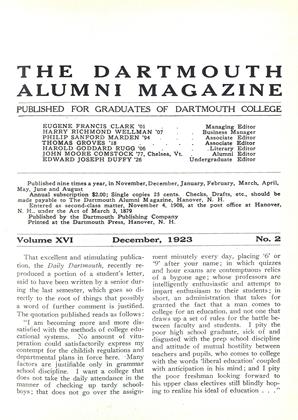The life of Samuel Walker McCall, of the Dartmouth class of 1874, came to a close at his home in Winchester, Mass., on Sunday, November 4th.
I have been requested to prepare for the ALUMNI MAGAZINE a brief estimate of his life and character. I regret that the time at my disposal is too limited to do the subject adequate justice.
For more than fifty years my life has been closely interwoven with that of McCall. There was nothing hidden or mysterious about his life—it was an open book. He frankly revealed his ambitions and aims in life. He was quite free from conceit, but was thoroughly self-reliant. During his college career he maintained a scholarship rank near the head of his class. This he was able to do without undue application to study. His mind was alert, and he acquired knowledge easily. He never was enthusiastic over class-room work, but always exhibited a lively interest in the general affairs of the College. Early in his college life he said, "Here is the Connecticut River flowing by our doors. Why is it there is no crew on the river ?" Largely at his suggestion the Dartmouth Boat Club was organized, a boat house built, and the College became a competitor in intercollegiate regattas. He was one of the founders of The Anvil, a new college publication, which achieved reputation as the first college paper in the country to engage in the discussion of public questions, and serve as a training school for journalism. He also showed a lively interest in the athletic sports of his college days.
Upon graduation McCall turned his attion to the study of law, was admitted to the Massachusetts Bar in November, 1875, and began the practice of law at Boston the January following. The constant application to details, so essential to success at the bar, did not appeal to his taste, and he soon drifted into journalism, and later into politics. These were the fields best suited to his talents. He achieved preeminent success in political life, and almost equal success in literature. His legislative career extended over a period of twenty-three years, of which three were in the Massachusetts Legislature, and twenty in the National House of Representatives. His service was of a constructive and statesmanlike quality. He grew in power and influence with length of service. He was a leader of opinion rather than of men. He asked no one to follow him who did not believe in his cause. He criticised measures, not men. He rarely made political enemies in debate, and enjoyed throughout his congressional career in a most unusual degree the good will and high regard of his colleagues.
When he retired voluntarily from Congress in 1913 he had reason to believe that he was soon to represent Massachusetts in the United States Senate. That position of great honor, which had for years been the goal of his ambition, was unfortunately denied him. By talent and temperament he was especially well fitted for service in that great forum, as a worthy successor to the famous Senators who had shed lustre on the old Commonwealth.
The people of Massachusetts always had a warm place in their hearts for McCall, and that was particularly true with reference to the so-called "middle class." They were pleased with his quiet, simple manner, and his apparent interest in their welfare. He had a genial smile and a good word for everybody. In 1916 he was elected Governor of the Commonwealth, and continued in office for three years, during the terrible strain of the great war. He administered that important office with marvelous efficiency, and proved himself an administrator of the highest order. During these years of active service in public life he found time to devote some attention to literature. He wrote books of biography, was a frequent contributor to magazines and periodicals, delivered many addresses and lectures, and a number of formal orations which will have an enduring place in American literature. He acquired quite early in his public career a pure and forceful English, which attracted the attention of scholars everywhere, and stamped him as a man of exceptional culture. No less than nine American colleges conferred upon him the honorary degree of LL.D.
At the time of his death he was engaged in writing the Life of Daniel Webster, to which he had already devoted some two years. When he left his office a few days before his death he laid aside his pen with no thought but that this work would go forward to completion.
It is too early to undertake to place any just estimate upon the value of the service rendered by Governor McCall, or the place that he is likely to be assigned in the history of his generation but of this we may be sure, that he is entitled to be classed with Dartmouth's distinguished sons.
SAMUEL WALKER McCALL
 View Full Issue
View Full Issue
More From This Issue
-
 Sports
SportsFOOTBALL
December 1923 -
 Article
ArticleThat excellent and stimulating publication, the Daily Dartmouth,
December 1923 -
 Class Notes
Class NotesCLASS OF 1903
December 1923 By Perley E. Whelden -
 Class Notes
Class NotesCLASS OF 1903
December 1923 By Perley E. Whelden -
 Article
ArticleALUMNI COUNCIL MEETS IN BOSTON
December 1923 -
 Class Notes
Class NotesCLASS OF 1911
December 1923 By Nathaniel G. Burleigh
Article
-
 Article
ArticleThrough the generosity of Mr. Arthur L. Livermore
-
 Article
ArticleE. W. Knight '87 Nominated as Alumni Trustee
December 1924 -
 Article
ArticleFOREIGN FELLOWSHIPS OFFERED
March 1925 -
 Article
ArticleALUMNI SECRETARIES AND EDITORS MEET AT OHIO STATE
May, 1926 -
 Article
ArticleHeads Business Group
June 1944 -
 Article
ArticleBetter and Better
December 1955



